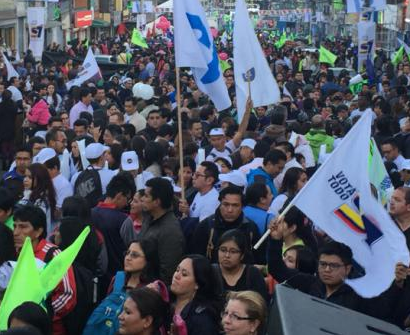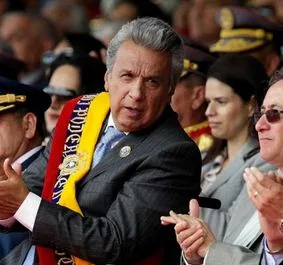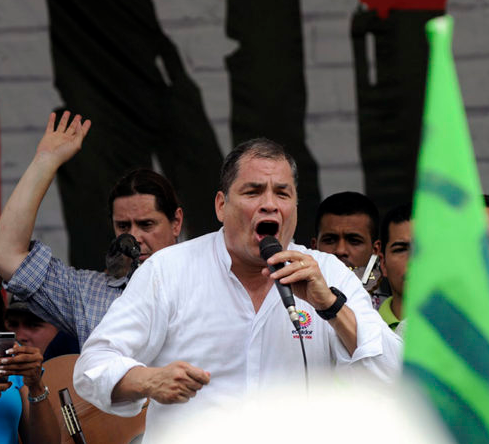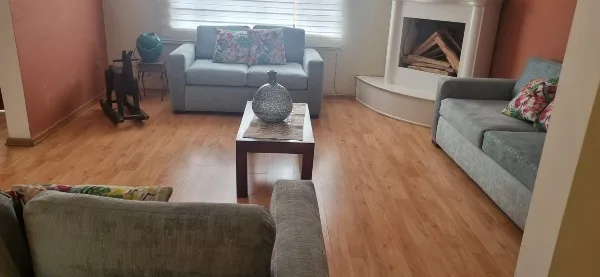Ecuador’s February 4 referendum: What are the questions? What’s at stake for Ecuador?
By Jamil Enrique Moscoso Villegas
Only ten months after electing Lenin Moreno to continue the policies of Rafael Correa, Ecuadorian voters are being asked to repudiate several of them in a seven-question public referendum.

The campaign for and against referendum questions ends on Friday.
Voters across the country go to the polls Sunday to vote “yes” or “no” on questions submitted by President Lenin Moreno. The questions — one of which would bar Correa from running again for president — have sparked heated debate, pitting supporters of Moreno against those of Correa, touch on a number of topics that will shape Ecuador’s political future.
Moreno makes his announcement
On September 18, President Moreno announced on his weekly television broadcast his decision to call a national referendum on a range of questions he considered crucial to restoring what he called the “the spirit of Montecristi,” referring to 2008 Constitution. During the broadcast, he encouraged the public to submit questions to be included on the ballot.
Nine days later, 700 civil and political organizations and private individuals had sent 2,739 questions to the presidential palace.

A referendum victory will leave President Lenin Moreno clearly in charge of the government.
On November 30, Moreno issued two presidential decrees mandating the National Electoral Council (CNE) to make preparations for the referendum. The move effectively ended the Constitutional Court’s review of the referendum questions, which Moreno claimed had exceeded the constitutional time limit. Supporters of Correa cried foul, claiming that the court was allowed extra time for its review based on procedural rules. Constitutional scholars were divided on whether Moreno had acted within his presidential rights to end the review but the court did not challenge his decision.
In December, a registration process for the referendum campaign was conducted by CNE, allowing political parties and civic organizations to campaign for or against the questions. In all, 40 organizations registered, with 36 saying they would campaign for “yes” and only four signing up on the “no” side.
The seven referendum questions
Question One. According to Moreno, the issue that the public cares most about is ending government corruption and punishing those engaged in it. It is no surprise then, that the first question calls for a series of changes to the Constitution increasing the penalties for public officials convicted of corruption.
If voted yes, question one would prohibit any citizen with a criminal record for embezzlement, illicit enrichment, bribery or money laundering from running for political office or serving as a public official. This language would replace article 23 of the Constitution.
Question Two. The second question would reinstate the two-term limit contained in the 2008 Constitution for some elected offices, including the presidency. Should the proposal be voted affirmative, the Constitution would be amended to allow political office-holders to be re-elected only once.
Correa had pushed a constitutional amendment to end term limits through the National Assembly in December 2015. At the time Correa’s Alianza Pais party held a super majority in the assembly.

A “no” vote on question two effectively ends former president Rafael Correa’s political career.
Not surprisingly, Correa fiercely opposes the quesstion since it precludes his return to power. Correa had once hinted that he might return to Ecuador from his current home in Belgium to oppose Moreno in the 2021 election. A “yes” vote on question two means this won’t happen.
Question three proposes a change to the organization and function of the Consejo de Participacion Ciudadana y Control Social (CPCCS).
Based on its counterpart in Venezuela, the CPCCS’s stated purpose is to fight corruption, enforce transparency, as well as to promote citizen participation in government affairs. The entity is composed of seven appointed members and seven alternates. Among its functions, the CPCCS appoints several cabinet level officers, including the attorney general, and oversees the national court system.
Critics claim, however, that the un-elected body is simply an extension of the presidency, usurping authority from the elected National Assembly.
A “yes” vote on question three would require CPCCS members to resign. The authority of the board would be reduced and its role would be redefined by the National Assembly. Under the new organization, no political party or coalition will be allowed to have members on the CPCCS.
Question four is intended to protect children and adolescents from sexual abuse, its inclusion the result of recent cases in schools in which adults have been arrested and convicted.
The Ministry of Education reports that between 2008 and October 2017, there were 919 convictions of teachers and other school personnel for sexual abuse of children.
If approved, question four would make amendments to the Constitution and the Ecuadorian criminal code (COIP) eliminating the statute of limitations for sexual offenses committed against children and adolescents. Sexual crimes against minors would join genocide, corruption, and other crimes, for having no prosecutorial time limits.
Question five would put restrictions on metal mining. In the question, voters are asked if they favor protecting environmentally sensitive, urban and historic areas from mining. A “yes” vote would outlaw mining in these area and require an amendment to the Constitution.
In 2016, social conflicts regarding mining were a recurring problem for Correa; Shuar communities in the Amazon region, for example, protested the presence of Chinese mining firms operating on their ancestral lands. More recently, the mining town of Zaruma, in El Oro Province, has been in the news because of cave-ins caused by tunnel mining, most of it illegal.
Critics of the question, including environmentalists, say it is vague and lacks enforcement mechanisms.
Question six asks voters if they favor rescinding the Ley de Plusvalia, a law intended to prevent land speculation that applies capital gains tax rates as high as 75% to real estate sales.
Critics claim the law went far beyond its intended purpose and harms average homeowners. The building industry says that law has extended a sharp downturn in construction and eliminated tens-of-thousands of jobs. They say a “yes” vote will revitalize the construction and real estate industries, leading to large employment gains.
Question seven. Oil extraction in the Yasuni National Park is at stake with the seventh and final referendum question. Voters will be asked if they want to limit the area where oil extraction is permitted, protecting more of the park. The question is: ‘‘Do you agree with increasing the intangible zone by an average of 50,000 hectares and reducing the oil exploitation area authorized by the National Assembly in the Yasuni National Park from 1.030 hectares to 300 hectares’’?
As with question five, environmentalists say the question does not go far enough, allowing oil production to continue in parts of Yansuni. They call it a “feel good” question.
A “yes” vote means a big win for Moreno
According to three polling organizations, voters appear ready to vote “yes” on all seven questions, with questions one and four, concerning corrupt officials and sexual offenders, receiving the most support. Overall, pollsters predict a 70% “yes” vote on February 4, a big win for President Lenin Moreno.





















